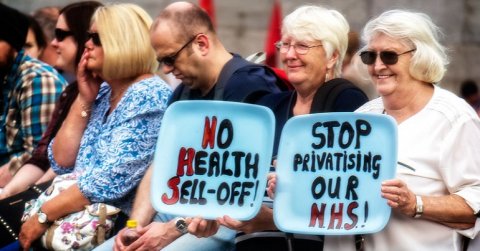
4 June 2020
By Judith Niechcial
You may not know that so-called NHS 111 is not the NHS at all. It is run by a company called Sitel, ‘a privately owned contact center [sic] headquartered in Florida Miami’. In April 2020, The Guardian reported that, during the Covid-19 outbreak the company recruited large numbers of unskilled staff, who received inadequate training, and worked in unsafe conditions.
The Covid-19 pandemic has highlighted in a sudden and dramatic manner how dependent we are as a society on the NHS as a public service. The Government, after decades of under-funding and undermining of the NHS, appears to have woken up to the fact that it needs to be able to rely on NHS staff responding to and implementing measures to protect and heal the public. This cannot be done by a patchwork to private providers, all with their own agendas, the most significant of which is to make a profit. However there is no guarantee that the privatisation agenda will not continue after the virus crisis is over.
This article aims to chart the decades’ long process of the undermining of the NHS which began as far back as 1977. Since that time successive governments have introduced policies that have sold off swathes of the NHS to private companies. Because the NHS is so beloved by the British public, no government has been up-front about what they are doing; to do so would be a vote loser. The public therefore remains largely unaware of the insidious dismantling of their much loved health service. This article aims to summarise the incremental changes that have already been made, in order to raise awareness, and, hopefully, lead to action to defend what is left of our public service.
The origins of NHS privatisation
The 2019 film ‘The NHS Heist’ revealed that a document from the Conservative Research Department dated as early as 30 June 1977 (i.e. two years before Mrs Thatcher came to power) declared that ‘Denationalisation should not be attempted by frontal attack, but by a policy of preparation for return to the private sector by stealth’. This set the tone for the subsequent denationalisation of public utilities, and in 1988 the Centre for Policy Studies published a pamphlet written by Oliver Letwin and John Redwood entitled ‘Britain’s Biggest Enterprise’, setting out ‘options for radical reform’ and noting how profitable the enormous NHS would be for the private sector.
The public service ethos within the NHS was arguably undermined by the Griffiths Report of 1983 which is credited with introducing a corporate managerial culture to the NHS, with ideas derived from business management theory. It recommended an NHS Management Board at arm’s length from the Secretary of State and civil servants. A market-based discipline came into the service characterised by performance indicators, and league tables; the priority became the meeting of targets, rather than improving service. For example, setting a target of a maximum four hour wait in A&E does not measure the actual quality of care provided. Furthermore hospitals were fined for not meeting targets, which led to a temptation to falsification of the evidence.
In 1990 Kenneth Clarke introduced the internal market into the NHS through the NHS and Community Care Act which created the ‘purchaser/provider split’, and made hospitals into budget-holding Trusts, independent of the regional health authorities.
PFI and creeping privatisation
John Major’s government (1990-97) started the Private Finance Initiative (PFI) whereby private companies are contracted to build public projects such as new hospitals. Servicing the debts incurred to private companies becomes more onerous over time, as contracts are sold between companies who can impose their own interest terms. Paying off debt has become more of a priority than providing health care, and has sent many a hospital trust into serious financial crisis. The initial £13 billion of private sector funded investment in new hospitals will end up costing the NHS in England a staggering £80 billion by the time all contracts come to an end in 2050. This is an example of the financialisation of every human motivation. It turns our instinct for compassion and care into a financial product to be bought and sold, directing money from taxpayers to private banks via NHS debt. It is money that should be spent on patient care, not filling the pockets of private shareholders.
Widespread, and almost un-noticed, privatisation started around 1993 with the out-sourcing of non-medical services such as catering and cleaning. A marked increase in hospital infections such as MRSA was soon noted. Privatisation is always sold on the three Es, Economic, Efficient, Effective, but it ends up being more expensive, less effective, and so vastly less efficient.
‘New Labour’ under Tony Blair continued the privatisation process, scaling up the PFI. In 2003 market oriented ‘NHS Foundation Trusts’ and their regulator, ‘Monitor’ were introduced. Alan Milburn was the Secretary of State for Health at the time. Following his resignation he took a well-paid post as an advisor to Bridgepoint Capital, a venture capital firm heavily involved in financing private health-care firms moving into the NHS, including Alliance Medical. He is now with Price Waterhouse Cooper. This is an example of the ‘revolving door’ between politics and private medical providers which is endemic nowadays. Former politicians such as Alan Milburn, Patricia Hewitt and Steve Dorrit have all worked in companies profiting from NHS contracts.
Sub-contracting and out-sourcing of medical services continued with the private sector ‘cherry picking’ less complex services to take on, such as elective surgery, leaving the NHS to deal with the harder to manage services such as A&E and treatment for the chronically ill. Medical staff of the private companies were, and are, of course, trained at public expense, before taking their skills out of public service.
Enter Andrew Lansley and the coalition
The Conservative/LibDem coalition agreement promised ‘no top-down reorganisation’ of the NHS, but Andrew Lansley’s disastrous 2012 Health and Social Care Act was just such a reorganisation. It abandoned publicly accountable Primary Care Trusts and Strategic Health Authorities and replaced them with Clinical Commissioning Groups (CCGs) made up of local GPs (taking time out from their clinical work to become administrators on these groups). The Act removed from the Secretary of State for Health the duty to provide a health service. Public Health was taken out of the NHS, and it is now shared between local and central government, accompanied by huge staffing cuts. The ‘public health grant’ to local councils is currently being cut, even as the pandemic rages. NHS Foundation Trusts are no longer obliged to provide particular aspects of health care, and there are complex requirements relating to the provision of essential services.
In 2012 the first contract for a private firm to run an NHS hospital was awarded to Circle Health, founded by Ali Parsa, an investment banker, to run Hinchinbrooke Hospital in Huntingdon on a ten year contract. Circle could not make a profit out of the project, and In 2015 the Care Quality Commission (CQC) reported the hospital as unsafe, and put it into special measures. Circle withdrew from the contract, whereupon the NHS had to pick up the tab, inheriting the debt of the private company. Another example of this disastrous process is the story of Liverpool University Hospital, where the huge private firm Carillion won a contract worth £335 million to build a 634 bed new hospital next to the crumbling 1960s building. When Carillion collapsed, leaving the building unfinished and with reports of cracks in the structure, guess what, the NHS has had to pick up the debt, and continue the building, thereby wasting millions of pounds of public money.
In 2002 the government decided to upgrade the NHS IT system, by contracting with private companies such as CSC, Accenture and the Japanese company Fujitsu, all of which withdrew from their contracts losing millions of pounds.. In 2013 a report by the influential Public Accounts Committee (PAC) concluded that this attempt ended up becoming one of the "worst and most expensive contracting fiascos" in public sector history. The project was abandoned, with estimates of the cost to the taxpayer which vary, but are in the region of billions of pounds.
In 2013 ‘NHS England’ replaced the NHS Commissioning Board. The Chief Executive is Simon Stevens, whose previous experience was as CEO of the largest private health company in America, United Health Group. The United States, of course, has an insurance-based system of health ‘care’ which excludes people who are not wealthy, and where health outcomes are among the worst in the Western world.
In 2015 Stevens introduced the ‘Five Year Forward View’. Local health ‘leaders’ were asked to come together into forty four geographical ‘Footprints’ and draw up ‘Sustainability and Transformation Plans’ (STPs) for their local areas within defined budgets. The planning is centred on the needs of local populations; fine in theory but difficult in practice. The commissioning and contracting work is complex, and learning has not been shared well between different areas. Funding cuts to social care and public heath added further difficulties. The STP fund in 2016/17 was spent mainly on covering provider deficits, not on development. Creating good management and leadership has been problematic, with a shortage of good staff at executive level. Considerable guidance from the centre has been necessary.
Regulation has also become more complex. The Care Quality Commission (CQC) is there carrying out inspections. Monitor has been replaced by ‘NHS Improvement’. Transparent it is not.
Integrating the private sector into the NHS
A deliberately bewildering number of acronyms abound, many of which doctors themselves do not understand – MCPs – Multi-speciality Community Providers, PACs -Primary and Adult Care Systems, then ACOs – ‘Accountable Care Organisations’. Contracts under ACOs can be managed by private firms. This caused protests, as the ACO is an American model of health provision, so they were renamed ‘Integrated Care Systems’ (ICS). These are just the same as ACOs but with a different acronym, also aimed at ‘integrating’ the private sector into the NHS when services are put out to tender, and contracts made. Are you still with me? The ‘Integrated Care Provider’ bidding for a service could be a NHS organisation like a hospital trust, or a private company such as Virgin Care. Private health care companies have a legal obligation to make profits for their shareholders, and this has priority over the standard of care provided to patients. They pay dividends and staff bonuses, so more public NHS funding is funnelled into private pockets (and thence to tax havens). Under the ICP contracts a private company could control the delivery of a whole range of non-hospital NHS and social care services for a large area. Or indeed could win multiple contracts across many areas, and so establish a near monopoly. There are now several very large private companies providing health services, for example, Care UK, Nuffield Group, BUPA, Virgin, Spire, and United Health. CCGs lack the skills, knowledge and capacity to procure and manage complex contracts such as those with such companies. They often tend to employ management consultancy companies to advise them, channelling yet more funds away from patient care. All this so called ‘reform’ is actually about managers rearranging contractual processes and funding streams, with attention diverted from what is actually best for patients and front line staff.
Funding falling and falling
Alongside all these CCG increased workloads, funding for General Practice has fallen in real terms over the past decade. Family doctors are under intense pressure, with impossible workloads, and soaring stress levels leading to serious GP shortages. In 2004 the Labour Government brought in changes to the GP contract, allowing corporate organisations such as Virgin and United Health to provide GP services. As an attempted solution to the GP crisis NHS England has set up ‘Primary Care Networks’ (PCNs). Local surgeries are being replaced by huge new super practices serving thousands of patients, and increasingly, these practices are being taken over by companies like Modality Partnership, which now operates in several different STPs across England. There is an increasing trend to transfer hospital services to the ‘community’. Work previously done by hospitals, for example care of people with long term conditions, are being transferred to PCNs, putting more pressure on already stretched-to-the-limit GPs. GPs have to join these networks in order to access funding. Some doctors welcome the economies of scale provided by PCNs, and the emphasis on employing a wide range of practitioners, for example physiotherapists and pharmacists. However, alongside this there is a process of ‘down-skilling’. For example a paramedic from the PCN could do a home visit instead of a doctor, and practice social workers are being replaced by ‘social prescribers’ who deal with issues such as benefits advice, and ‘signpost’ to other services.
In primary care what is needed is better workforce planning, increased funding, and more doctors, rather than continuous ‘top-down’ reorganisations.
Mental Health care is also problematic. The notorious 2012 Health and Social Care Act changed the way mental health is funded; with Mental Health Trusts now only part of the picture as funding is also distributed by GPs, local authorities, the voluntary sector, and, nota bene, the private sector. This makes it difficult to quantify how much money is actually spent on providing mental health care, with consequent disagreements between NHS England and the Royal College of Psychiatrists as to the extent of the cuts to mental health services. For example, children needing the support of Child and Adolescent Mental Health services (CAMHS) notoriously have to wait months before they can be seen. Private organisations such as the Priory Group benefit, as wealthy patients, rather than waiting months and years for an NHS service, move to them for quicker provision. This is what is called ‘two tier’ provision, as people on low incomes have perforce to remain on NHS waiting lists, as their conditions worsen. The long term effects of this trend will inevitably lead to yet further increased, and expensive, demand in the future.
The role of the popular media in undermining the NHS is considerable. Myths are created; Immigration is blamed for over-stretching the NHS, whereas in fact the NHS would not exist were it not for the labour of doctors, nurses and carers from overseas, and ‘health tourism’ is blamed for alleged failures. The narrative of NHS ‘failure’ holds sway. There has been a deliberate running down of the public service culture and chronic underfunding which is designed to make the public think that the NHS is ‘failing’, which in turn is used to justify further privatisation.
In 2018 a record £9.2 billion was handed to private providers such as Virgin Care, and the Priory mental health group.
Privatisation and the coronavirus crisis
During the coronavirus crisis the Conservative government rented thousands of beds in the many private hospitals in the UK for an alleged £2.4 million per day. This is an example of how running the NHS at under the necessary capacity becomes incredibly costly when disaster strikes. Private profit is justified on the basis of illusory cost-efficiency.
People across the country have been applauding NHS staff on their doorsteps every Thursday evening. On his discharge from St Thomas’ Hospital on 12 April 2020 after suffering from Covid-19 the Prime Minister Boris Johnson said, ‘Our NHS is the beating heart of this country. It is the best of this country. It is unconquerable. It is powered by love’. Many political decisions are reached because of personal experience of politicians. Let us hope that this, now openly expressed, widespread admiration for the NHS, will bring to an end these covert, underhand measures to break it up and distribute it to privateers. The public cannot comprehend that a government would want to dismantle a public health service. If the population generally understood more clearly the acute danger to our precious health service from privatisation, there would be an outcry. I hope this article throws some light on how the NHS has been undermined over the decades, and on the processes which must now urgently be reversed in order to keep our health service public. A mass public mobilisation is needed. There should be an end to hiring expensive management consultants as advisors. Health ministers should not use their inside information by taking roles on the boardrooms of private companies when they ‘retire’. There should be an end to contracting out NHS services to private’ providers’. Above all the dreadful 2012 Health and Social Care Act should be repealed, and the measures it brought about reversed.
Judith spent her career as a local authority social worker, mainly in the fields of children, families and mental health. She is a Quaker, and a Labour party member.

Image credit: Garry Knight - Creative Commons







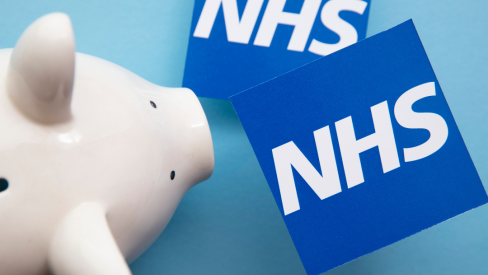


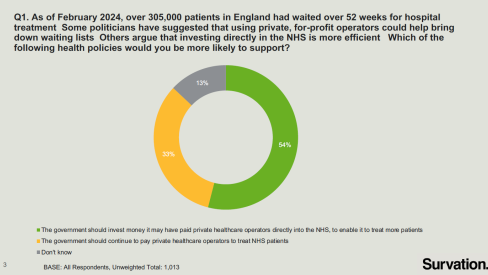
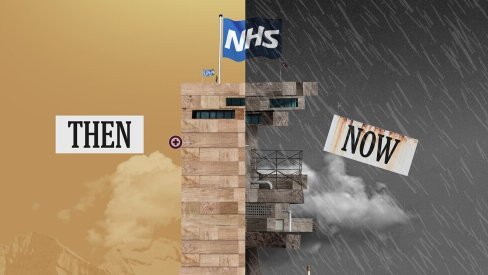
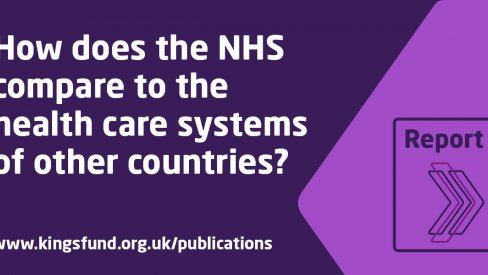

Comments
MGB replied on Permalink
"A mass public mobilisation is needed."
Agreed - but how? Most people are fooled by the skewed statistics and false reassurances from the Govt on TV and in the (mostly biased) Media.
Maybe we need bite-sized factual rebuttals that we can post on social media in response to those spreading untruths.
Emily Corker replied on Permalink
Its our NHS
Anonymous replied on Permalink
Defend Our NHS was formed in 2011 to oppose the Lansley 2012 Health & Social Care Act which effectively abolished the NHS as we know it. The move to a USA model of health provision is a frightening reality.The tendrils of privatisation are deep and wide and long and historically embedded in the NHS. The fight to keep our public health service, the envy of the world, is the fight of our lives.
Kathryn Hayman replied on Permalink
I hate to sound pessimistic but I believe the tendrils of privatization are so deeply embedded that there's almost no unravelling them and dispensing with them for good. The public as you say, need educating and many people do not want to be educated. how can you make somebody listen when they really don't want to know or are indifferent, or they don't realise the import of these inimical happenings. Or, more likely they are so preoccupied with survival and feeding their family they simply don't have time to think about this stuff. There is also a sense of powerlessness in the face of these very powerful forces. Somehow we need to galvanise people into really waking up to what this government and previous governments have done and are doing to not only the NHS but every other aspect of our lives. Trashing, vandalising, stealing, murdering by indifference and neglect; all of this is laid at the door of the government and their global superpower companies. A huge demo after covid-19 lockdown ends from all corners of this country to descend on Downing St and demand an absolute End to these private contracts. And then another one and another one and so on and on until they stop because if we don't they won't stop.
Amanda Hunter replied on Permalink
Spot on. I agree with you on all counts. Where do we go from here in terms of challenging the indifference you rightly highlight and mobilising citizens into action?
Robert Oulton replied on Permalink
One thing you could do is try and find out what's happening with the ICS (integrated care scheme) in your area. These are the organisations by which final transfer of most of the NHS to big private corporations will be managed, via so-called '10 year 'single integrated care provider contracts (imagine NHS equivalent of rail franchises and you've got it).
The ICS's are, at the moment, sailing by the seat of their pants, because, as Judith says above, what they are attempting is so complicated they haven't got the management expertise, but also so controversial they daren't come out into the open about it. Unfortunately, because they are not yet statutary bodies, they don't need to offer open board meetings. But you may find they have anodyne 'stakeholder' meetings which you can get to (our 'Surrey Heartland' ICS does), but your CCG will be very involved, and they DO still have to be accountable to local people, so check out your CCG board, who they are (could be your own GP in there somewhere) or the lay board member of your CCG. The Government knows how to shrug off national protests, but determined local people making a nuisance of themselves locally, can be surprisingly effective, especially if its happening all over the country. One of the unforseen side effects of the Lansley reforms is that it did actually potentially empower local health communities (which is why NHSE was on the case almost as soon as the ink was dry on the bill). Those levers still (just about) exist. But you will have to dig around a bit. You'll likely find your own local CCG has been rolled up with several others into the ICS, and not nearly so open about things like AGM's which they still DO have to hold. Find out when their AGM is and go along and speak up. Covid has bought a little time, but its still short.
Stephanie Woodier replied on Permalink
Why aren't these issues being aired on primetime television news programmes? Whilst everyone is focussed on the pandemic, the dismemberment of the NHS continues behind government rhetoric, smoke screens and closed doors to pave the way, unimpeded, for ever more privatisation. Is this democracy?
John Lewis replied on Permalink
Same reason, money owns the media and the interests stealing from us.
Heather Newsome replied on Permalink
You say-"The Government, after decades of under-funding and undermining of the NHS, appears to have woken up to the fact that it needs to be able to rely on NHS staff responding to and implementing measures to protect and heal the public" Do you really believe our Government is concerned with protecting and healing the sick? I don't think so
Anonymous replied on Permalink
I would like to know who owns GPs surgeries. The whole system stinks.
Elizabeth Topalian replied on Permalink
As the core administrative structure of the NHS is centralised and politicised perhaps a campaign to regionalise medical care administration would be useful. Have core city, large town centres for heart, stroke, cancer care and regionalise all other care. Different regions often have different medical problems, ie damp areas have more chest illness. It is no wonder our Doctors and Nurses are fed up and disenchanted with this stupid wieldy and expensive system. I am sick and tired of our infrastructure being sold off to corporates, like our transport, water system, energy system. It is no wonder nothing works properly.
Stephen Rickwood replied on Permalink
People need to read this https://saveournhskentdotorgdotuk.files.wordpress.com/2022/09/sonik-conflicts-of-final-aug-2022.pdf East Kent Hospitals University Trust is being systematically run down to deliver it into private hands. This will be the aim of ever Integrated Care Board across the country. It is no coincidence that the C.E.O of Kent And Medway I.C.B Mr Paul Bentley who has a private company is also chosen by the secretary of state to see this underhand privatistion through and by the way the I.C.B's are accountable to nobody.
Add new comment